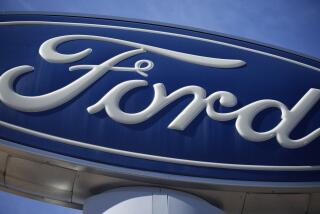Detroit’s Drive to ‘Go Green’
- Share via
America’s Big Three auto makers see a green future--environmentally superior cars and the dollars they’ll produce. General Motors, Ford and Chrysler all have plans for alternative-fuel, low-emission vehicles. While not every critic is persuaded that Detroit is serious about going green, it’s clear that the auto makers are embracing dramatic innovation.
Their usual reaction has been resistance to change. They kicked and screamed over seat belts and air bags and fought rear-guard actions against emission reductions and fuel-economy developments. The car makers lobbied alongside oil and coal companies against international efforts to limit tailpipe emissions. They lost that fight last month at the international global warming conference in Kyoto, Japan.
Now there appears to be real impetus for change. Detroit’s new enthusiasm for clean cars surely lies primarily in the need to compete. At the Tokyo Motor Show in October, Japanese auto makers surprised the industry with six models with alternative power systems. Most noteworthy was Toyota Motor Corp.’s hybrid electric-gasoline Prius. The last time Detroit ignored a Japanese innovation--fuel-efficient small cars in the 1970s--it took years to catch up.
The Big Three will be detailing their clean-car plans at this week’s North American International Auto Show in Detroit. General Motors Corp., the world’s largest maker, says it intends to produce by 2001 a new low-emission hybrid electric vehicle that gets up to 80 miles a gallon and by 2004 a car powered by a fuel cell. The company is pressing ahead despite the disappointing consumer response to its innovative but limited-range EV1 electric car; only 300 have been leased in California and Arizona.
Ford Motor Co. reports that this fall it will begin producing sport utility vehicles and mini- vans with emissions no greater than for most passenger cars, in addition to its own projects with more exotic engines. Chrysler Corp. plans a lightweight Dodge that uses a diesel engine and an electric motor. Government pressure is part of all this. Last month, the California Air Resources Board proposed subjecting light trucks, pickups, sport utility vehicles and minivans to the same smog controls as passenger cars by 2004.
With the costs of retooling in mind, Detroit has often viewed change as a problem rather than a solution. But today the economic value lies with innovation. None of the U.S. auto makers appear ready to say that mass marketing of clean vehicles is just around the corner, but the race indeed has started to become the first major auto maker to fairly claim the environmental mantle. In a $1-trillion-a-year global industry that’s a goal worth the race.






